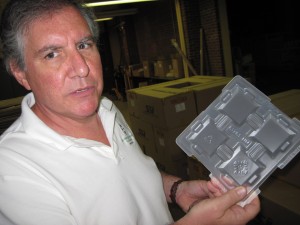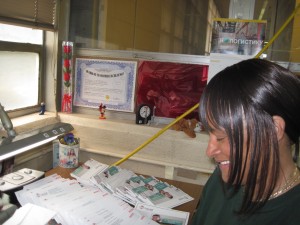Workshop thriving with disabled workers

From a better mousetrap to truer bookkeeping, the best business plans ”“ the ones that survive six-plus decades in the marketplace ”“ always answer a need.
In 1947, IBM general manager Dause Bibby recognized two needs and set about righting them: a population of young men wounded in World War II looking for work, many with loss of their legs, and a curious manufacturing tray that looks like a throw-away from Dunkin Donuts, but is really a costly IBM manufacturing platform, a thing to be fixed with solvents and compressed air rather than chucked.
IBM needed the trays fixed. Bibby had the organizational skills. In 1948, the Mid-Hudson Workshop for the Disabled Inc. was born. Today, repairing the 2011 version of those manufacturing trays ”“ more than 100,000 per year ”“ has helped keep IBM the top contractor of services for the 52,000-square-foot factory and nonprofit business on Washington Street in Poughkeepsie.

Humbly at first in a former radio studio, Bibby enlisted the then-Poughkeepsie Chamber of Commerce and the Poughkeepsie Kiwanis Club to help. His plan was to have disabled veterans repair the trays that trundle along IBM”™s assembly lines. Though they look insignificant, the trays dimples and dents are engineered for specific needs and, in the words of Bill DelTosta, the workshop”™s sales and marketing director whose 30-year work history is in Manhattan media, “They cost a lot of money.”
Until the 1990s when it scaled back in the Hudson Valley, IBM had been an even bigger part of the workshop”™s business; IBM alumni always sat and continue to sit on the workshop”™s board of directors. “IBM has continued to be a staunch supporter, our biggest and longest-term contractor,” DelTosta said.
With Big Blue cutbacks in Kingston and East Fishkill, “We had to seek other options. IBM never left us, but the need to diversify was real.” In his three years with the workshop, DelTosta estimated he has ramped up marketing efforts five-fold. Last year, on the upswing from the depths of the recession, the workshop attracted “just under” $1 million in contracts.

“One of the strengths I think I bring to the table is an aggressiveness that a lot of nonprofits do not have,” he said. “The nonprofit world can be rather staid and stodgy, plodding along at 3 mph. I came along and have been a bull in the china shop.” The result: “We are far more aggressive now in our outreach to prospective clients.” A Kent resident, husband and father, he said he wanted to give back to the community. “Working in Manhattan all those years made that difficult.”
Target stores found the workshop via its flashy new website, which DelTosta called “a huge marketing tool” for new business. “Target wanted to ship Dr. Seuss books to libraries,” Del Tosta said. The workshop researched libraries for Target, labeled and shipped 25,000 books. It further illuminated the world by assembling the 43 lighting sections that grace Walkway Over the Hudson, eventually stringing together the complete 1.2 mile length. “That includes wiring connectors in control boxes and mounting transformers, and assembling the relays, timers and fuses that control the system.”
The workshop today is a nonprofit source of labor and equipment for any business that wants to sign on. The workforce consists of disabled persons, both military and nonmilitary, suffering from disorders that can include Parkinson”™s-like maladies, cancer, heart disease, diabetes, paralysis, brain tumors, combat-related illnesses like PTSD, and even substance abuse. If it conjures a rogues”™ gallery, the reality plucks at the heartstrings. With 25 years as a production manager for various companies, Ralph Malone has spent eight of them at the workshop and said, “This is the first place I”™ve ever worked where people arrive a half-hour ahead of time. All of our employees are great people. They just happen to have some disability.”

The average employment stay is 13 years. The jobs include health benefits.
Malone spends “90 percent of my time” on a single contract for Stamford Scientific International Inc, making aerators for water filtration plants. The work is shipped all over the world, including to the world”™s largest hog slaughterhouse, in North Carolina.
“Stamford Scientific, which has been with us for eight or nine years, really drives home our uniqueness,” DelTosta said. “We exclusively serve disabled veterans and other physically or medically handicapped individuals.” This distinguishes the workshop from centers that employ the developmentally disabled, “And allows for higher skill-level work.” Rob Grant runs an industrial drill-press for Stamford Scientific in one room; Mark Bolde solders wires in another for Lighting Services Inc. in Stony Point, a new client.
Other clients include the Dutchess County Regional Chamber of Commerce, which uses the workshop to stuff and prepare for shipping its newsletters. Another is Dutchess-based Laerdal Medical Corp., for whom the workshop packages and ships its life-support training equipment.

“There is, frankly, very little that we will not do,” DelTosta said.
At its pre-recession peak, the workshop employed some 70 persons; now the number is 25, although DelTosta, fresh from a sales trip to Rochester, said that number is on the rise.
The pricing of services is “very critical,” according to general manager Peter Cantline. “It”™s very competitive out there. We work very hard to prepare quotes that are good for our workers and still get accepted.” Cantline had served on the workshop board since 2005 and possesses a 40-year work history in engineering and surveying. “When the general manager position became available, I raised my hand and they threw a rope around it,” he said laughing. “With Bill DelTosta”™s efforts in marketing, attracting new clients and working with repeat clients, our goal is to hire more disabled people, including more disabled vets.”
About one-quarter of workshop staff are disabled veterans; DelTosta would like that number at 50 percent. He touts a recent hire at Nilda”™s Desserts Ltd., which bakes its and other companies”™ foods on site in a leased space that will double next year. DelTosta characterized the relationship as symbiotic ”“ “a wonderful, happy marriage” ”“ noting Nilda”™s most recent employee is a disabled Iraq War veteran. “That”™s a hire near and dear to our hearts.”